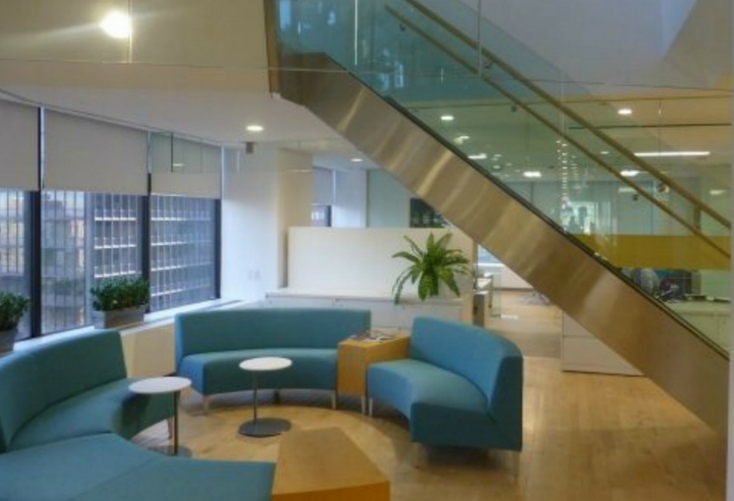- Laura Kozelouzek explains how she came up with a mutually beneficial partnership agreement with the Van Wagner Group
- The agreement enabled Quest Workspace to open a new location in New York City, with more new locations on the way
- The solution allows Van Wagner to make revenue from the space while also giving Quest’s coworking members access to top of the range amenities
In 2010, Laura Kozelouzek launched Quest Workspaces. Today, Quest operates 8 locations in Florida and 1 in New York. Their most recent opened on January 1st, 2018 at 800 3rd Avenue Midtown in New York City, and it is unlike any other Quest location.
In a conversation with Allwork.Space, Laura explained why exactly Quest at 800 and 3rd is so unique, what benefits its given Quest and the Van Wagner Group, and why workspace operators seeking to grow their brand should offer a similar workspace solution.
The Backstory
Quest’s newest location is located within the offices of the Van Wagner Group. When the Van Wagner Group sold their Billboard unit, keeping the Van Wagner Sports and Entertainment branch, this left them with an incredible amount of empty space in their office, to the point that they were only using about 25% of it. Van Wagner decided the best economic option was to sublet their space and Laura Kozelouzek was originally introduced to them as a potential subletter.
As Laura toured the space and understood what Van Wagner was trying to achieve, she came up with a smarter solution. Laura proposed that instead of subletting the space at a loss, Van Wagner should partner with Quest and allow them to operate a coworking space within Van Wagner’s office, manage the entire space, and monetize the common areas, empty offices and amenities.
The Proposed Workplace Management Solution
Quest incorporated a shared workspace and coworking operation to the current Van Wagner offices, located at 800 and 3rd. The 75% of the space that was unused would be turned into a combination of collaborative workspace and private offices; the reception area, cafeteria, and other amenities would be shared between Van Wagner Group and Quest members.

Why It Works
For companies locked into traditional leases that either have excess underutilized space or fluctuating space requirements, this solution lets them grow or contract on demand. If companies are proactive about this, they can include this approach in their real estate strategy by planning for a certain percentage of flexible space that can be monetized within the space they plan to occupy. It’s an effective solution that can generate revenue and help companies offset their real estate expense.
For the Van Wagner Group specifically, the arrangement allowed them to effectively manage their own real estate expenses on demand, more so than if they were to sublet the space and relocate, entering into a static lease. Additionally, they are currently earning profit in the space. During the process of incorporating Quest, Quest evaluated their operating expenses — before the project officially launched Van Wagner was able to save over 6 figures a year in expenses such as cleaning and electricity.
Economically speaking, the project is a success.
How To Replicate The Model
Laura believes there are various ways to structure this type of arrangement. However, she does admit that there are challenges and in order for it to work, the flexible workspace operator should be creative and have a very open mindset; there is no cookie-cutter approach to this.
Operators seeking to offer a workplace management solution to companies and current office tenants need to have the ability to truly understand the culture of each company in order to successfully integrate their services, amenities and culture with that of the existing tenant.
Let’s take for example Van Wagner and Quest’s combined amenities. Van Wagner already had an operating cafeteria, which now offers breakfast, lunch, and snacks throughout the day for employees and Quest members. Additionally, the space offers complimentary weekly manicures, shoe shining, and other high-end services. Laura shares that these amenities were chosen because this is what Van Wagner Group offered as employee perks; as a group they decided to open these services to coworking members, too.
The same amenities could or could not work for a different corporate tenant. Laura adds that while Quest does have core amenities and services that it offers across all of its locations, based on a specific region, market, or situation they might also opt to deliver other unique amenities. It’s a process, and you learn as you grow. The key point with services and amenities is to successfully integrate both the workspace operator and the company’s vision.
Business-wise, the contract can be structured in different ways. Quest and Van Wagner opted for a management contract, where the extra space is being run as a coworking space. Quest is earning a management and participation fee that is based on the success of the coworking portion of the business. Van Wagner, with this arrangement, has been able to offset its real estate expenses, with the coworking business contributing to the rent the company is paying.
Keep in mind that these arrangements are not easy to come up with and structure. They are complicated and need to account for numerous variables, so make sure you have someone on board that can help you structure a beneficial agreement for both parties and execute effectively.
Van Wagner Employees and Questers’ Response
Laura mentions that at first, it was an adjustment for everyone and that there was a certain amount of finesse that had to go into bringing both groups of professionals together. Operators considering adding a management solution to their services should think about events that can help smooth out the initial interactions and make sure that everyone in the space feels a part of the same community. Laura believes that in time, the combination and collaboration between both groups will create a more energized, creative and inspiring workspace experience.
Looking Ahead
For Laura and the Quest team, this is the first of many. Quest is actively pursuing these types of arrangements as a growth strategy. Quest is ready and prepared to replicate this model anywhere in the United States and is currently having several discussions with companies that are interested in the service.

 Dr. Gleb Tsipursky – The Office Whisperer
Dr. Gleb Tsipursky – The Office Whisperer Cat Johnson – Coworking Marketing Maven
Cat Johnson – Coworking Marketing Maven Angela Howard – Culture Expert
Angela Howard – Culture Expert Drew Jones – Design & Innovation
Drew Jones – Design & Innovation Andrea Pirrotti-Dranchak – Competitive Advantage
Andrea Pirrotti-Dranchak – Competitive Advantage Jonathan Price – CRE & Flex Expert
Jonathan Price – CRE & Flex Expert Jeremy Fennema – Tech Innovation Alchemist
Jeremy Fennema – Tech Innovation Alchemist







